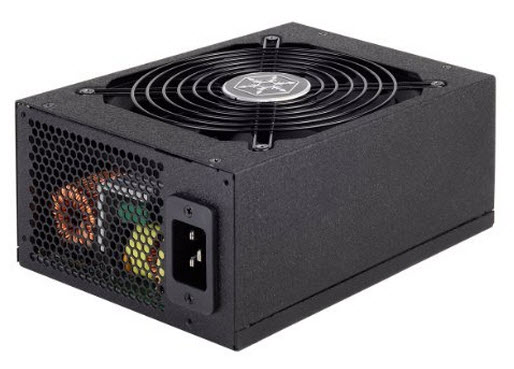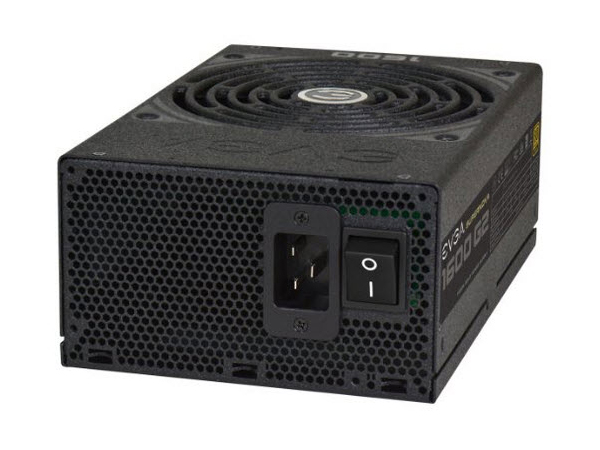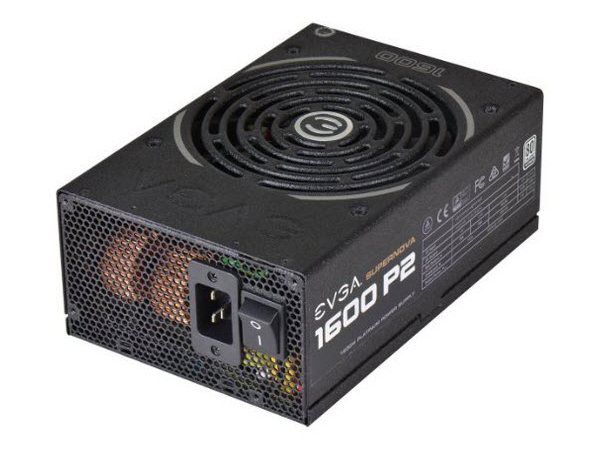Corsair AX1500i Titanium PSU Review
Today, we're taking a look at Corsair's flagship power supply unit. The AX1500i is a digital, 1500 watt, 80 PLUS Titanium-rated beast of a PSU!
Why you can trust Tom's Hardware
Load Regulation, Hold-Up Time And Inrush Current
To learn more about our PSU tests and methodology, please check out How We Test Power Supply Units.
Primary Rails And 5VSB Load Regulation
Load Regulation testing is detailed here.
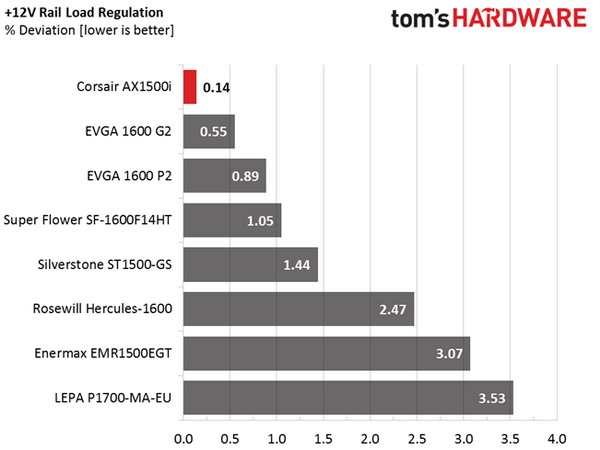
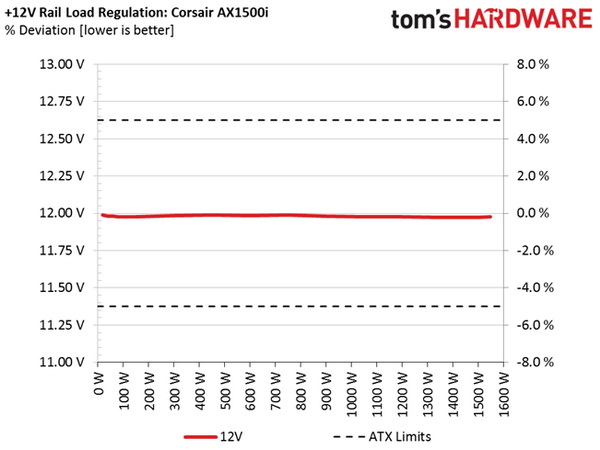
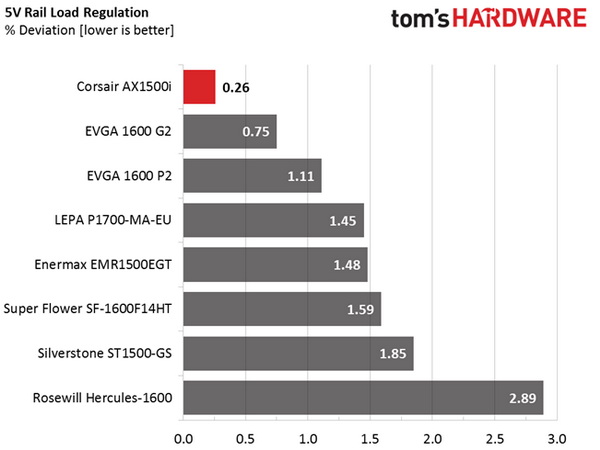
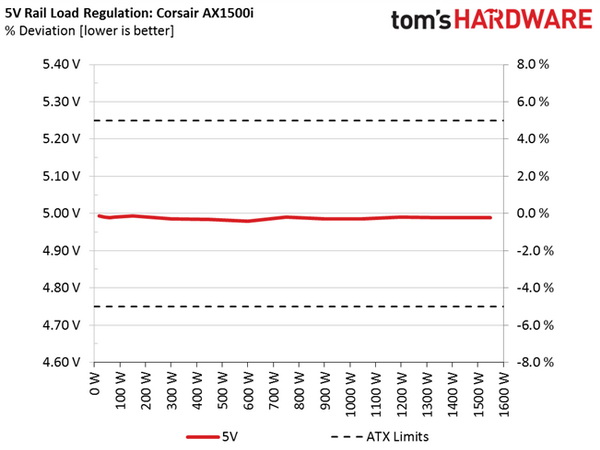
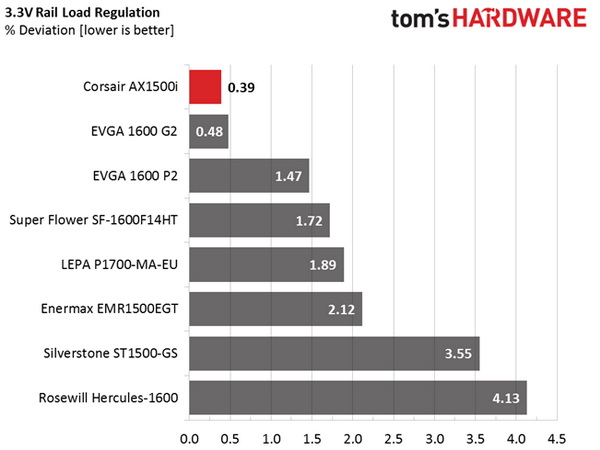
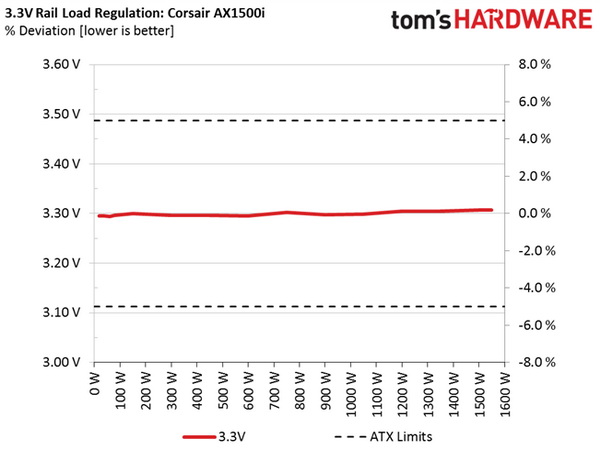
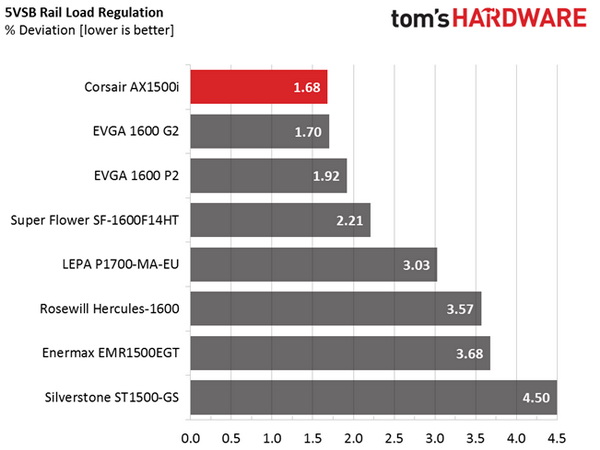
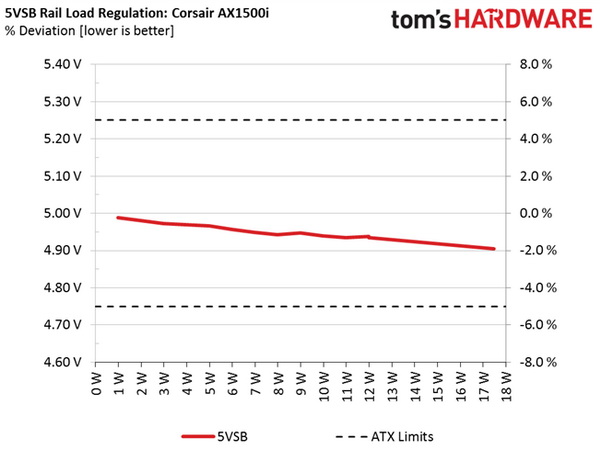
Hold-Up Time
Our hold-up time tests are described in detail here.
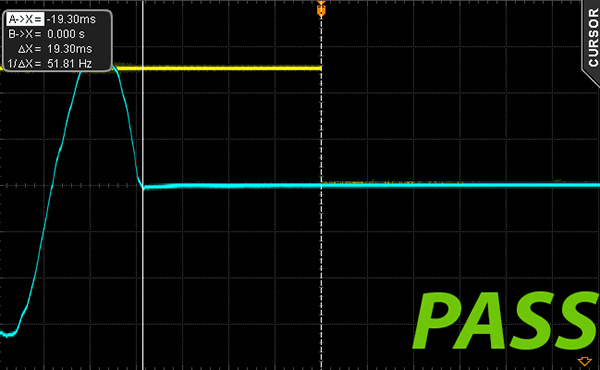
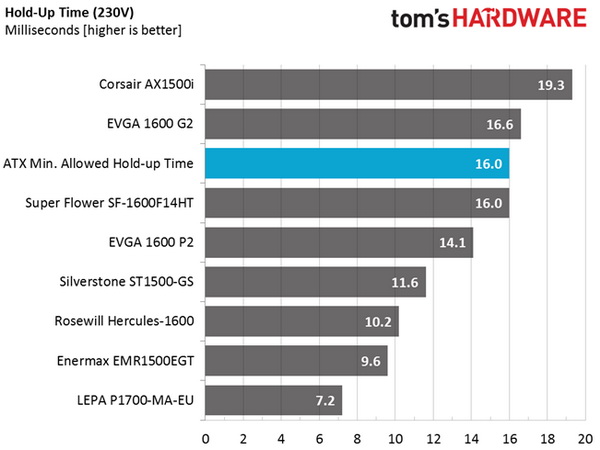
The hold-up time easily surpassed the minimum allowed limit that the ATX spec sets. The advanced design of this platform allowed for this good result, since the combined capacity of the bulk caps is rather low for such a strong PSU. To give you an example, the Super Flower Leadex Titanium unit has much larger bulk caps with 1,560µF combined capacity; however, it registers a significantly lower hold-up time of 16 ms.
Inrush Current
For details on our inrush current testing, please click here.
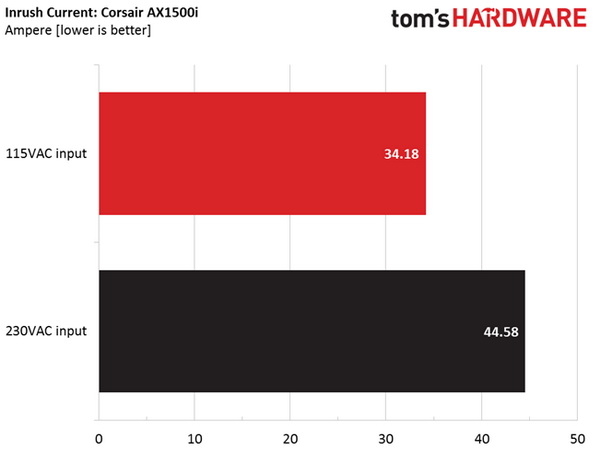
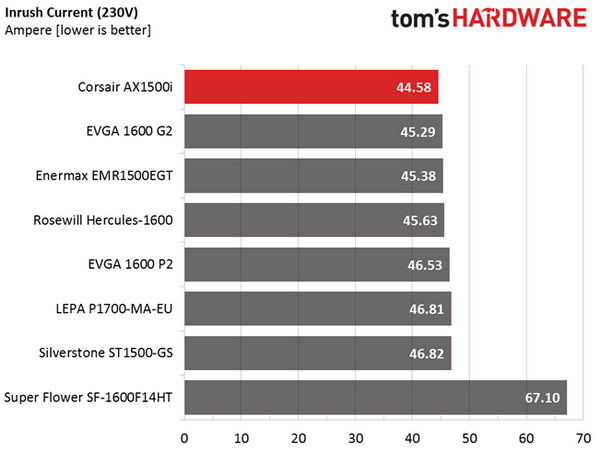
The inrush current is pretty low for a PSU, with 1.5kW max power.
Load Regulation And Efficiency Measurements
The first set of tests reveals the stability of the voltage rails and the PSU's efficiency. The applied load equals (approximately) 10 to 110 percent of the maximum load the supply can handle, in increments of 10 percentage points.
Get Tom's Hardware's best news and in-depth reviews, straight to your inbox.
We conducted two additional tests. During the first, we stressed the two minor rails (5V and 3.3V) with a high load, while the load at +12V was only 0.10A. This test reveals whether a PSU is Haswell-ready or not. In the second test, we determined the maximum load the +12V rail could handle with minimal load on the minor rails.
| Test | 12V | 5V | 3.3V | 5VSB | Power (DC/AC) | Efficiency | Fan Speed | Fan Noise | Temp (In/Out) | PF/AC Volts |
|---|---|---|---|---|---|---|---|---|---|---|
| 10% | 10.705A | 2.004A | 1.999A | 1.004A | 149.78W | 90.99% | 0 RPM | 0 dBA | 45.54°C | 0.986 |
| 11.975V | 4.993V | 3.300V | 4.967V | 164.61W | 42.06°C | 115.1V | ||||
| 20% | 22.432A | 3.000A | 2.999A | 1.209A | 299.70W | 92.81% | 0 RPM | 0 dBA | 47.38°C | 0.984 |
| 11.986V | 4.986V | 3.296V | 4.956V | 322.93W | 43.52°C | 115.1V | ||||
| 30% | 34.511A | 3.509A | 3.517A | 1.410A | 449.74W | 93.62% | 0 RPM | 0 dBA | 48.74°C | 0.991 |
| 11.987V | 4.984V | 3.296V | 4.949V | 480.39W | 44.43°C | 115.1V | ||||
| 40% | 46.591A | 4.014A | 4.002A | 1.614A | 599.59W | 93.37% | 376 RPM | 18.5 dBA | 40.81°C | 0.994 |
| 11.986V | 4.980V | 3.295V | 4.942V | 642.19W | 50.50°C | 115.1V | ||||
| 50% | 58.304A | 5.004A | 4.997A | 1.814A | 749.45W | 93.28% | 536 RPM | 22.9 dBA | 41.94°C | 0.996 |
| 11.989V | 4.990V | 3.302V | 4.948V | 803.45W | 52.23°C | 115.1V | ||||
| 60% | 70.087A | 6.014A | 6.001A | 2.020A | 899.33W | 92.61% | 632 RPM | 25.8 dBA | 42.43°C | 0.997 |
| 11.979V | 4.986V | 3.298V | 4.940V | 971.13W | 53.94°C | 115.1V | ||||
| 70% | 81.848A | 7.017A | 6.999A | 2.225A | 1049.18W | 91.77% | 768 RPM | 30.7 dBA | 44.28°C | 0.997 |
| 11.975V | 4.985V | 3.299V | 4.935V | 1143.24W | 56.78°C | 115.1V | ||||
| 80% | 93.580A | 8.014A | 7.984A | 2.429A | 1199.18W | 90.77% | 952 RPM | 34.5 dBA | 45.65°C | 0.998 |
| 11.977V | 4.990V | 3.305V | 4.938V | 1321.19W | 59.54°C | 115.1V | ||||
| 90% | 105.787A | 8.518A | 8.500A | 2.429A | 1349.26W | 89.85% | 1392 RPM | 45.6 dBA | 47.00°C | 0.998 |
| 11.974V | 4.988V | 3.305V | 4.935V | 1501.73W | 61.34°C | 115.2V | ||||
| 100% | 117.509A | 9.028A | 8.982A | 3.564A | 1499.03W | 89.02% | 1704 RPM | 51.4 dBA | 48.62°C | 0.998 |
| 11.972V | 4.988V | 3.307V | 4.904V | 1683.90W | 63.22°C | 115.2V | ||||
| 103% | 121.648A | 9.028A | 8.980A | 3.565A | 1549.07W | 89.04% | 1800 RPM | 52.9 dBA | 48.81°C | 0.998 |
| 11.976V | 4.988V | 3.307V | 4.904V | 1739.84W | 63.86°C | 115.1V | ||||
| CL1 | 0.099A | 22.028A | 19.998A | 0.000A | 177.48W | 84.06% | 1544 RPM | 49.0 dBA | 45.62°C | 0.978 |
| 11.982V | 4.979V | 3.331V | 5.018V | 211.13W | 56.00°C | 115.1V | ||||
| CL2 | 124.935A | 1.002A | 1.003A | 1.001A | 1507.39W | 89.19% | 1728 RPM | 51.6 dBA | 47.61°C | 0.998 |
| 11.959V | 4.997V | 3.298V | 4.975V | 1690.15W | 61.97°C | 115.1V |
The results of these tests are really good, showing the advantages of digital control. Load regulation is almost perfect on the +12V, 5V and 3.3V rails, while at 5VSB it is very good as well, staying within 2 percent. On top of that, the PSU achieved really high efficiency levels; however, with 50 percent of its max-rated-capacity load and with full load, it didn't manage to hit the really high 80 Plus Titanium requirements (94 and 90 percent), at least during the tough conditions under which we conducted our tests. Finally, although we pushed the AX1500i very hard, it managed to operate quietly, and the noise went high only with very high loads (90 percent and above).
During our overload test, we had shutdowns with anything above 1600 W after a while, so we stayed at 1550W, where the PSU operated without any problems, even at 49°C ambient temperature. In the past, we tested two AX1500i units with both of them, easily delivering 1650W of power with the same tough conditions in place; however, this unit didn't do us that favor. Since it isn't wise to operate a PSU beyond its limits, we won't consider the strict overpower limit of the AX1500i as a negative.
Corsair Link Screenshots
You will find several screenshots of the Corsair Link software below, which we took during our test sessions.
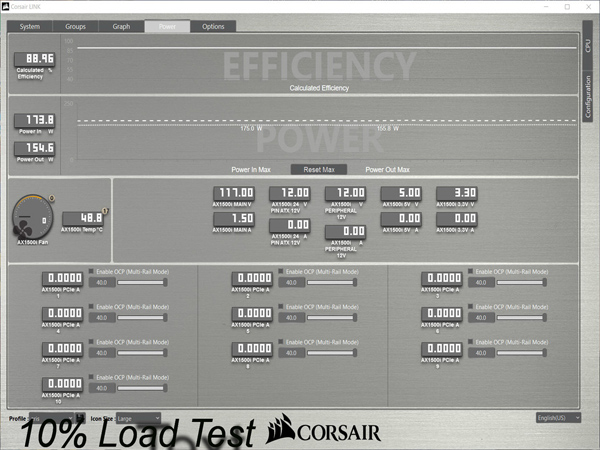
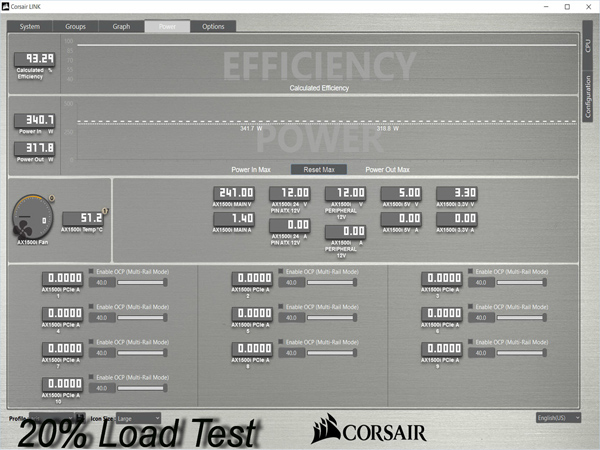
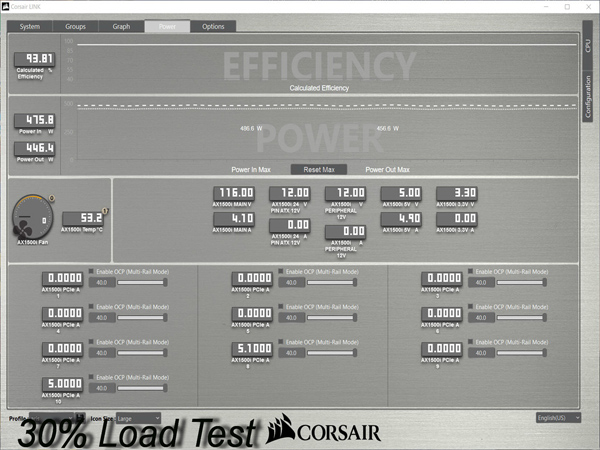
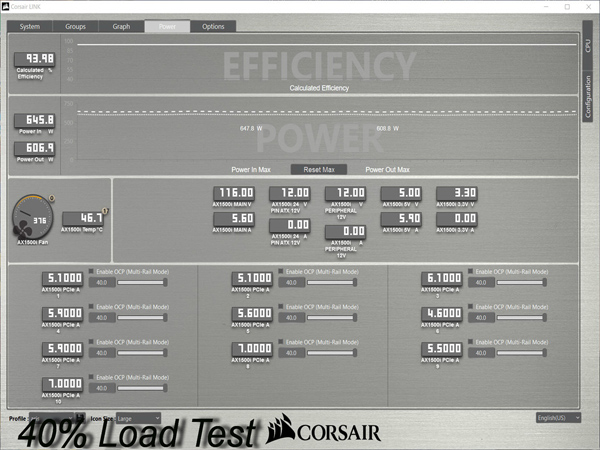
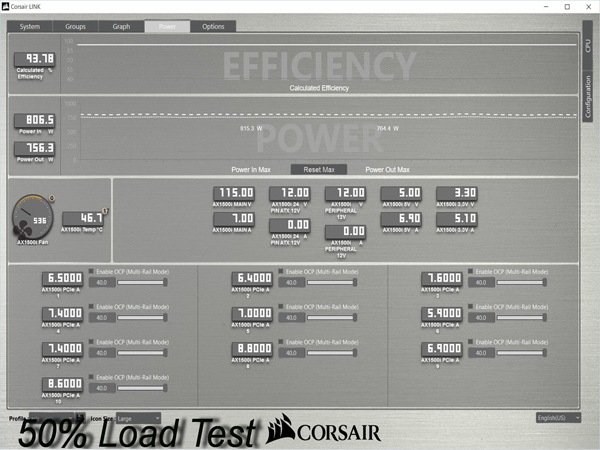
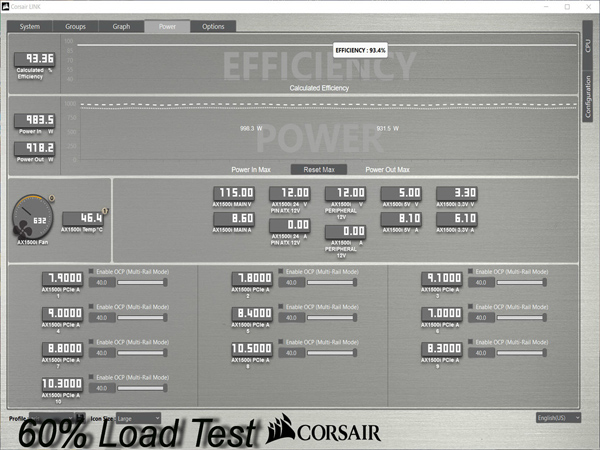
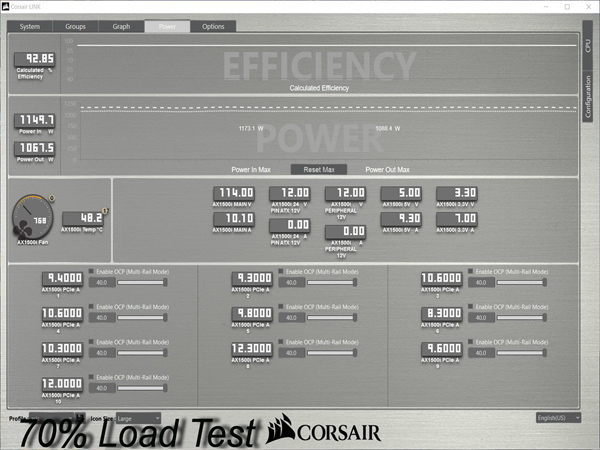
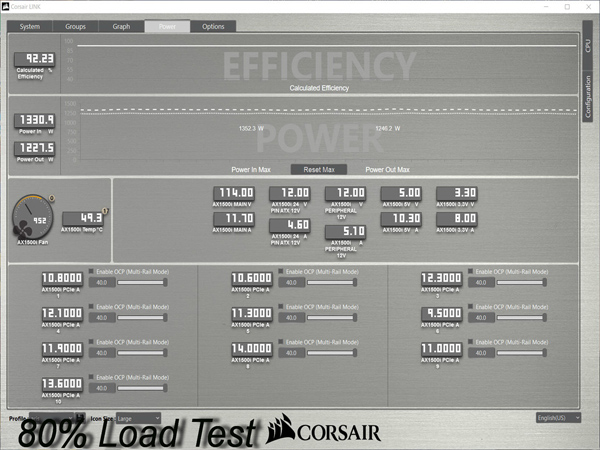
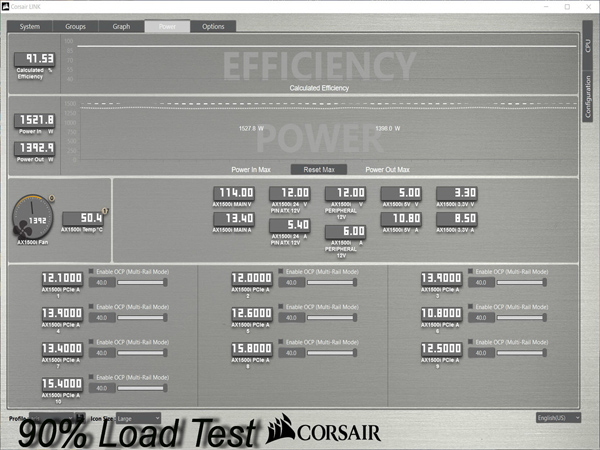
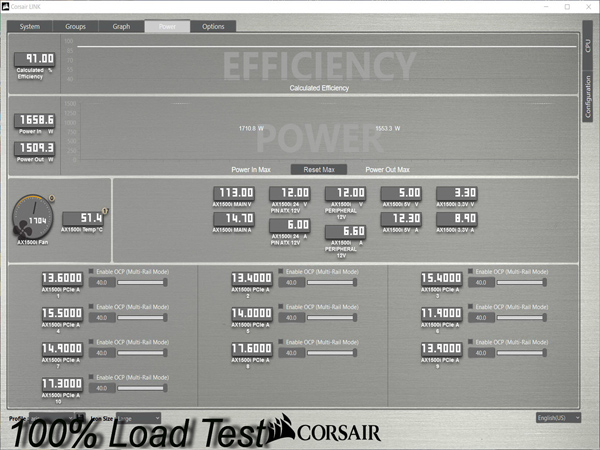
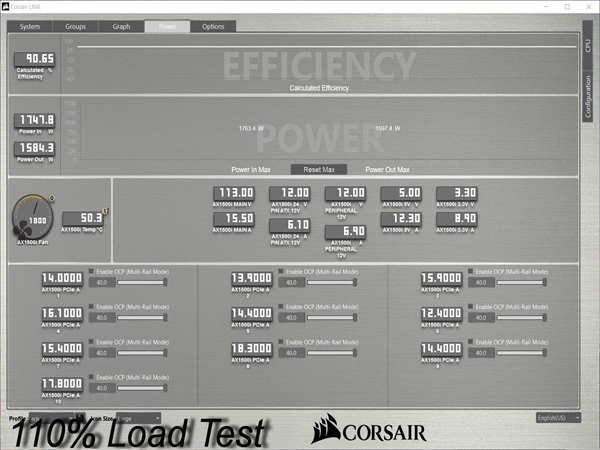
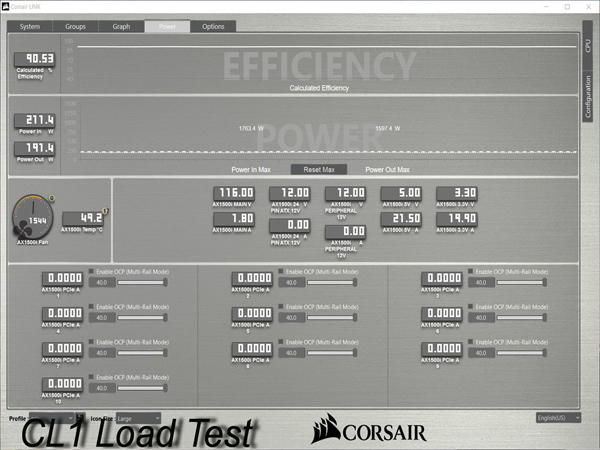
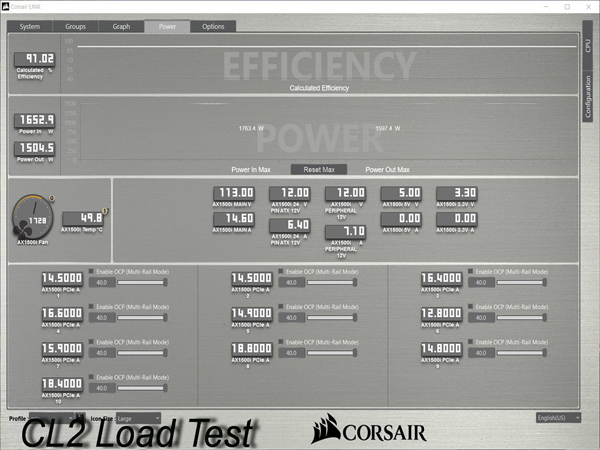
The efficiency levels and the watt power consumption that the Corsair Link application provides aren't very accurate, especially as the load increases. We could say that they are very optimistic — showing significantly higher efficiency levels — than the ones that we measured with our lab-grade equipment. We also noticed that at a level of amperes of around 4.5A and below, the Corsair Link app shows zero ampere readings on the PCIe and EPS connectors. Corsair should provide a fix for this issue as soon as possible.
Current page: Load Regulation, Hold-Up Time And Inrush Current
Prev Page A Look Inside And Component Analysis Next Page Efficiency, Temperature And Noise
Aris Mpitziopoulos is a contributing editor at Tom's Hardware, covering PSUs.
-
Nuckles_56 For such an expensive unit, why on earth did they put the CapXon caps in rather than a complete set of Japanese ones?Reply -
basroil Wow, this thing has almost as good of regulation and transient responses as the Seasonic 660XP2! And at 1500W no less... Might be a good PSU for not just 4-way K80 workstations, but also powering 12VDC robots too!Reply -
mctylr ReplyCorsair's flagship power supply unit (PSU) offering, the AX1500i, is the best PSU money can buy today, according to many experts in the field.
Honestly?! Do you believe that anyone can reasonably assume that this is an impartial, unbiased review when that is the review's opening?
Argument from authority (or appeal to authority) isn't what I expect from a Tom's Hardware review. -
Bossyfins ReplyCorsair's flagship power supply unit (PSU) offering, the AX1500i, is the best PSU money can buy today, according to many experts in the field.
Honestly?! Do you believe that anyone can reasonably assume that this is an impartial, unbiased review when that is the review's opening?
Argument from authority (or appeal to authority) isn't what I expect from a Tom's Hardware review.
He said to many others in the field. Pretty sure he is not implying himself. -
jimmysmitty Reply16665297 said:For such an expensive unit, why on earth did they put the CapXon caps in rather than a complete set of Japanese ones?
They are polymer caps, as mentioned, which might not make a difference even if they went with Japanese caps. In fact looking at the results even some that probably have all Japanese caps got beaten in many areas. -
Eggz Good review, but please do something about the large arrows blocking the garphs' labels. I can't read what the data actually presents with that info blocked.Reply
As for the actual unit, we know it's good. This thing's been out for about a year now. We at least now have conformation from a pretty reliable source, so thanks for that!
And for this:
Argument from authority (or appeal to authority) isn't what I expect from a Tom's Hardware review.
What is wrong with appealing to authority? I don't know astrophysics, but I can tell you something about it if an astrophysics professor tells me about it. And how would the professor learn his basic knowledge before becoming a professor? Text books, probably. Who wrote those? Ah, yes authorities in the field!
Dismissing references to authorities, as a non-expert, is stupid. It's essentially saying "Since this person has dedicated his (or her) entire life to researching this topic, I will definitely make up my mind on that topic without considering what he (or she) has to say about it." That falls right under the definition of intentional ignorance.
To be fair, though, the article didn't cite to an actual authority. It assumed that the readers will have familiarity with other rigorous review sites like Jonny Guru, who reviewed the AXi1500 back in April of 2014, giving it the only 10/10 ever with the following comment: http://www.jonnyguru.com/modules.php?name=NDReviews&op=Story&reid=378
I was starting to think nobody would ever send me a unit good enough. People, THIS is what it takes to get a perfect total score from me. Might be the last time you see it, too. Goes without saying I need to slap in that good old recommended logo right here
-
mctylr Reply16667641 said:Argument from authority (or appeal to authority) isn't what I expect from a Tom's Hardware review.
What is wrong with appealing to authority? I don't know astrophysics, but I can tell you something about it if an astrophysics professor tells me about it.
Dismissing references to authorities,
Argument from authority is not about presenting or relaying knowledge from a known authority, but the premise that the argument(*) should be accepted on the basis that it came from an authority, not that the argument should be evaluated and (conditionally) accepted based on its own merit.
(*) or in this context a review
Perhaps I was sloppy in my usage. My concern is that by making such a reference to unspecified experts' opinions, introduces a potential cognitive bias, namely that the reviewer (Aris) expected the review unit to perform to those expectations, and not necessarily report with an impartial review of the unit as received and as actually measured.
While I assume the power supply is of excellent quality, and I have no reason to expect any intentional or deliberate wrong-doing, the opening of a review with such a reference of praise, suggests that they reviewer could be subtlety influenced by these expectations during the review process.
In my opinion such a reference to other reviews / opinions does not belong in a review introduction, but if mentioned it should be brought up during the conclusion of the review.
-
Amdlova I see some corsair s... inside its not better than an evga power, Seasonic all for the win!Reply -
iam2thecrowe Reply16667294 said:16665297 said:For such an expensive unit, why on earth did they put the CapXon caps in rather than a complete set of Japanese ones?
They are polymer caps, as mentioned, which might not make a difference even if they went with Japanese caps. In fact looking at the results even some that probably have all Japanese caps got beaten in many areas.
Here's some opinions of capxon caps: http://www.badcaps.net/forum/showthread.php?t=20979
I know I wouldnt trust them, have seen too many blow, and theres really no reason to cheap out on such a high end psu. But, the reason they used them may have been due to sizing, availability of those specs or something else....... They might measure well when theyre new, but will they last?..... This is something a review can never tell us unfortunately. I guess as long as theyre rated generously, they should be ok, polymer caps will have much less tolerance to overvoltage. -
Eggz Reply16668249 said:
My concern is that by making such a reference to unspecified experts' opinions, introduces a potential cognitive bias, namely that the reviewer (Aris) expected the review unit to perform to those expectations, and not necessarily report with an impartial review of the unit as received and as actually measured.
That's a fair concern generally, but the reasons giving rise to it seem misplaced. The particular place in a review that someone gives praise - beginning, middle, or end - doesn't make much of a difference for anyone who edits their writing, which I'm sure this reviewer does. It's actually good practice to open with lessons learned for this type of article; otherwise, the piece would be meandering and simply take readers through the experimentation process in real time. That's boring and would probably decrease readership.
As for whether to mention (or allude to) other reviews at all, I am not sure it's a good idea for Tom's reviewers to intentionally ignore other reputable reviewers. In all likelihood, many of them are acquaintances from various trade shows. But more importantly, I'd expect a Tom's reviewer to have read all other serious reviews before writing his own. Without doing that, they'd run the risk of writing repetitive information, or worse, writing a less informative review than others currently available. Being familiar with the work of others in your field is part of what builds credibility.
I'm not trying to say that we should pretend Tom's is immune to fallacious logic. It's good to think about those things. My point is just that it didn't seen to present a real problem here.
